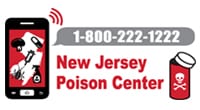What is a poison?
A poison is any substance that can hurt your body or make you sick if used in the wrong way, by the wrong person, or in the wrong amount. Poisons may be solids, liquids/sprays, or gases and can be found in many living things (i.e., the venom of some animals, plants, sea-life, spiders or insects).
Poisons can enter the body through the following ways:
- Mouth – Eating/Drinking
- Nose – Breathing/Smelling
- Eyes – Splashed
- Skin – Touching/Spills/Bites/Stings
The dose ingested determines how toxic something is to the body. Anything can be poisonous if you are not careful.
Who gets poisoned?
Each year, between 2 to 4 million actual poisonings occur in the United States. It is estimated that over 50% of these exposures involve children under the age of six. As of 2004, unintentional poisoning (person taking or giving a substance not meaning to cause harm) is the second leading cause of injury death in the United States.
Anyone can be affected by unintentional poisoning. Most poisoning occurs in the home and at any time of the day or night. The NJ Poison Control Center assists callers of all ages (infants, children, teens, young adults, adults and older adults) and those who speak languages other than English. The NJ Poison Control Center also receives calls regarding pets.
Common poisons for children:
- Cosmetics such as perfume or nail polish, and personal care products such as deodorant and soap
- Cleaning products (for example, laundry detergent and floor cleaners)
- Pain medicines (analgesics) such as acetaminophen or ibuprofen
- Foreign bodies and toys including silica gel packages to remove moisture in packaging and glow products
- Topical preparations such as diaper rash products, hydrogen peroxide, acne preparations or calamine lotion
Source: American Association of Poison Control Centers
Common poisons for adults:
- Pain medicines (analgesics) which can be over-the-counter, prescribed or illegal. Some examples of pain medicines are aspirin, oxycodone, acetaminophen, methadone, and ibuprofen
- Sedatives (drugs to reduce anxiety), hypnotics (sleeping pills), and antipsychotics (drugs used to treat mental illness)
- Household cleaning products
- Antidepressants (drugs to treat depression)
- Cardiovascular drugs (drugs to treat heart disease)
- Alcohols
